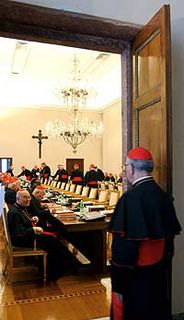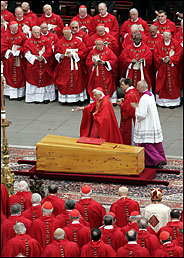
Who's Next? Theirs to Decide

Economist.com: "A NEW global togetherness flashed into being, and immediately began to disintegrate. That is how future historians may record the funeral of John Paul II on Friday April 8th, which was attended by hundreds of thousands of people and watched on television by perhaps as many as 2 billion, one-third of the human race.
Thanks mainly to the electronic possibilities which the pope used so well, his passing has generated, at least for a fleeting moment, an intense feeling of fraternity, and common destiny, among people in most corners of the earth. Of these, about 1.1 billion, or roughly 17% of mankind, are adherents of his faith; a huge number of others admired him from a greater distance.
For the pope’s keenest admirers, the two most striking features of the Catholic church in the years to come—whatever decisions are taken now—will be the lack of John Paul’s physical presence, and his influence as a source of inspiration. There is probably no other leader in the world whose funeral would be attended by both America’s George Bush and Iran’s Muhammad Khatami, and inspire fulsome tributes from them and from Cuba’s Fidel Castro. Nor, in the history of Christendom, has there been a prelate whose willingness to build bridges, and acknowledge past misdeeds, has drawn so many tributes from observant Jews, pious Muslims and non-Catholic Christians who are instinctively suspicious of Rome.
He assumed the papacy at a time when its importance in global affairs, along with that of most other religious institutions, seemed set to decline. He bequeaths a church which shows no sign of bowing out or running out of steam. Yet underneath the fanfare and the outpouring of grief, there is an uneasy feeling that the church faces not one but a series of overlapping existential challenges which no individual, however gifted or charismatic, can cope with alone.
Saintly pastor or able executive?
The next pope will need the votes of two-thirds of the 116 cardinal-electors. So a candidate can be blocked by the votes of 39. The Latin American cardinals alone can muster 21, and could probably count on the support of many of the other voters from the developing world. Intriguingly, under rules brought in by John Paul in 1996, in the event of a deadlock the two-thirds threshold can be dropped to a simple majority—if more than half the cardinals agree that this should happen.
Should a deadlock occur, it has always been assumed that the conclave could turn to someone of great spirituality.
Others, however, still feel that running a global organisation with 4,700 senior executives (bishops) and 400,000 line managers (priests) requires a capable executive rather than a saintly pastor. "

PJPII Funeral Mass









No comments:
Post a Comment